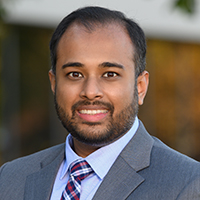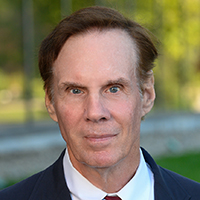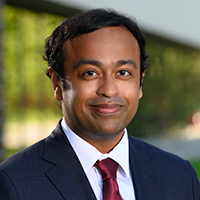Community Health Network's thoracic surgeons are specialists who can help diagnose and treat esophageal cancer. When esophageal cancer is found early, your chances of recovery are better. It’s important to understand the symptoms and risk factors of esophageal cancer for early detection.
Please contact us for a consultation if you have concerning symptoms or have already been diagnosed and would like to discuss treatment options.
To make an appointment with an esophageal or thoracic cancer provider, call Community's oncology scheduling specialists at 317-621-2627 or request an appointment online.
Request Appointment Online
What Is Esophageal Cancer?
Esophageal cancer occurs in the tissues of the esophagus, the long, muscular tube that runs from the back of your throat to your stomach. Although not as common as lung or breast cancer, it is the sixth leading cause of cancer deaths worldwide.
The two most common types of esophageal cancer are esophageal adenocarcinoma and esophageal squamous cell carcinoma.
- Adenocarcinoma begins in the lower esophagus. Risk factors are frequent heartburn, obesity and smoking.
- Squamous cell carcinoma usually begins in the middle to upper areas of the esophagus.
Less common esophageal cancers are neuroendocrine tumors (which affect hormone cells) and lymphoma (which spreads from esophagus lymph nodes).
Who Is at Risk?
Esophageal cancer risk increases with the following factors and conditions:
- Older individuals (age 55+)
- Men
- Chronic heartburn (acid reflux or GERD)
- Long-term smoking or tobacco use*
- Excessive use of alcohol
- Barrett's esophagus - In this condition, the cells lining the lower esophagus change to abnormal cells that could lead to cancer. It is often caused by chronic gastric reflux or heartburn.
- Poor diet
- Obesity
- Exposure to certain chemicals, including lye and dry-cleaning chemicals
- Medical history of squamous cell cancer, head/neck cancer and HPV
- Other medical conditions: achalasia, Tylosis or Howel Evans Syndrome, esophageal webs
*For help with quitting smoking, call 800-QUIT-NOW or visit https://quitnowindiana.com.
Esophageal Cancer Symptoms
Early signs of cancer in the esophagus often include difficult or painful swallowing and unexplained weight loss. Other symptoms include pain behind the breastbone, coughing or hoarse voice, indigestion and heartburn, and a lump under the skin.
Keep in mind, these symptoms are present in many other conditions and do not necessarily indicate cancer. The best way to be sure is to talk with your primary care doctor about symptoms that do not get better over time.
Getting a Diagnosis
To diagnose esophageal cancer, your provider will do a physical exam and take a health history.
Various screenings of the upper digestive system may be recommended, including a barium swallow study or esophagoscopy. During an esophagoscopy, a thin lighted scope, or tube, is inserted into the esophagus to look for issues in the tissue. Tissue samples may be taken for further examination at a lab as needed. If both the esophagus and stomach are examined, the procedure is called an upper endoscopy.
After a diagnosis of esophageal cancer is confirmed, your doctor may recommend additional tests to determine whether your cancer has spread to your lymph nodes or to other areas of your body. These tests could include:
- Endoscopic ultrasound (EUS)
- Computerized tomography (CT)
- Positron emission tomography (PET)
Minimally Invasive Treatment Options
Treatment plans for esophageal cancer may include a combination of surgery, radiation, and/or chemotherapy or immunotherapy depending on the type of cancer, tumor size and stage, tumor location, and the patient’s overall health. Your multidisciplinary team will work with you and your family to ensure you receive the best treatment plan possible.
To remove tumors in the esophagus, a thoracic surgeon may perform an esophagectomy. This procedure is used to remove some or all of the esophagus between the mouth and stomach where the tumor is present. At Community, our expert surgeons are specially trained to perform esophagectomies using minimally invasive techniques, including the robotic da Vinci Surgical System.
 Dr. Rachit Gupta specializes in minimally invasive thoracic oncology and is an expert in lung cancer, esophageal cancer, mediastinal malignancies and benign thoracic diseases. He can perform robotic resections of thoracic malignancies in all of these areas.
Dr. Rachit Gupta specializes in minimally invasive thoracic oncology and is an expert in lung cancer, esophageal cancer, mediastinal malignancies and benign thoracic diseases. He can perform robotic resections of thoracic malignancies in all of these areas. Dr. Kenneth Kesler specializes in thoracic surgical oncology and is an expert in lung cancer, esophageal cancer, mediastinal malignancies, and benign thoracic diseases. Prior to joining Community Health Network, Dr. Kesler was the surgical director of the Indiana University Thoracic Oncology Program, professor of surgery, and a faculty mentor to general and thoracic surgery residents.
Dr. Kenneth Kesler specializes in thoracic surgical oncology and is an expert in lung cancer, esophageal cancer, mediastinal malignancies, and benign thoracic diseases. Prior to joining Community Health Network, Dr. Kesler was the surgical director of the Indiana University Thoracic Oncology Program, professor of surgery, and a faculty mentor to general and thoracic surgery residents.